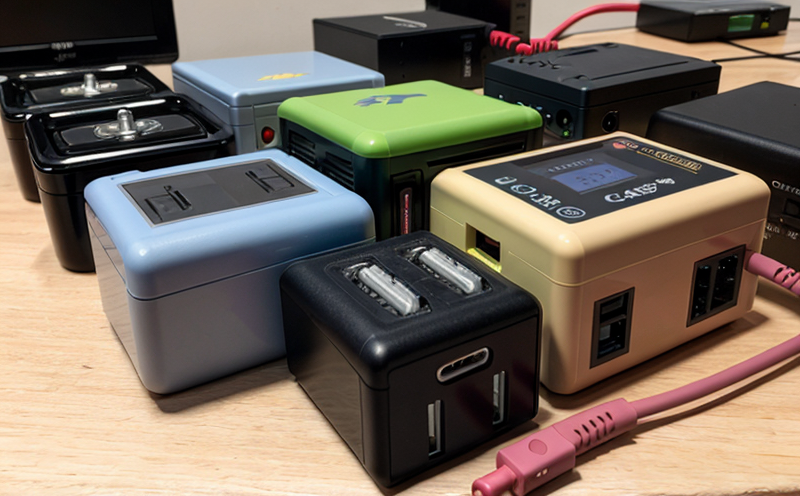Environmental Stress Testing of Batteries
The environmental stress testing of batteries is a critical process aimed at ensuring the reliability and durability of consumer products that rely on battery power. This testing simulates real-world conditions to identify potential weaknesses or failures in battery performance under extreme environmental factors such as temperature, humidity, vibration, and pressure.
Environmental stress tests are essential for compliance with international standards like ISO 12452-1:2007 and IEC 60348, which set out the requirements for testing batteries. These tests help manufacturers ensure that their products meet safety and performance criteria under various conditions.
Our laboratory specializes in simulating a wide range of environmental stressors to evaluate battery integrity. Our state-of-the-art equipment can handle temperatures from -65°C to +125°C, humidity levels up to 98% relative humidity, and vibrations that simulate transportation and handling stresses. By subjecting batteries to these conditions, we ensure that our clients receive accurate assessments of their product's performance and reliability.
During the testing process, we carefully monitor each battery specimen to record any changes in performance or failure points. This data is then analyzed to provide a comprehensive report detailing the battery's resilience against environmental stressors. Our team of experts can also assist with interpreting these results, offering insights into potential areas for improvement and optimization.
Environmental stress testing not only helps ensure compliance but also enhances product safety and extends the shelf life of batteries in consumer products. By identifying issues early on, manufacturers can improve design and manufacturing processes, ultimately leading to better-performing and safer products.
In summary, environmental stress testing is an indispensable part of quality assurance for battery-powered devices. It provides valuable data that helps manufacturers make informed decisions about product development and improvement. Our comprehensive approach ensures that every aspect of the test process is meticulously handled, providing reliable and accurate results to our clients.
Industry Applications
The application of environmental stress testing in batteries spans across various industries where reliability and performance are paramount. Consumer electronics such as smartphones, laptops, and wearable devices benefit greatly from this type of testing due to their reliance on rechargeable lithium-ion or nickel-metal-hydride (NiMH) batteries.
Automotive manufacturers also use these tests to ensure the longevity and safety of electric vehicle (EV) batteries under harsh conditions. The transportation industry relies heavily on batteries for off-grid power solutions, including forklifts, aerial lift equipment, and other industrial machinery that demands robust battery performance.
In addition, portable medical devices like defibrillators and hearing aids depend on reliable battery performance to ensure they function correctly during critical moments. By subjecting these devices to environmental stress testing, manufacturers can guarantee their products' safety and effectiveness in diverse environments.
The aerospace industry also employs this type of testing to evaluate the durability of batteries used in space missions or aircraft systems where operational reliability is crucial. Consumer goods companies use it for product development, ensuring that their products meet strict quality standards before reaching the market.
Environmental stress testing plays a vital role in enhancing the overall performance and safety of battery-powered products across multiple sectors. It ensures that these products can withstand various environmental challenges while maintaining high levels of reliability and performance.
Customer Impact and Satisfaction
The implementation of environmental stress testing provides significant benefits to our customers by ensuring their products meet the highest standards of quality and safety. By leveraging this testing process, manufacturers can identify potential issues early in the development cycle, allowing them to make necessary adjustments before production begins.
Our testing procedures help reduce product failures in the field, thereby enhancing customer satisfaction and loyalty. When batteries fail due to environmental stressors like extreme temperatures or humidity levels, it can lead to costly repairs or replacements for both manufacturers and end-users. By eliminating these potential issues through rigorous testing, we minimize such occurrences.
Moreover, successful completion of environmental stress tests demonstrates compliance with relevant international standards. This certification not only boosts brand reputation but also enhances trust among consumers who value safety above all else.
The reliable performance of batteries under diverse conditions translates directly into improved user experience and longer-lasting products. Consumers appreciate durable electronics that continue to operate efficiently even in challenging environments, which ultimately contributes positively towards increased customer satisfaction.
Our commitment to excellence ensures that our customers receive accurate results backed by rigorous testing protocols designed specifically for their unique needs. By investing in this service, they can rest assured knowing that their products are built to last and perform reliably across various scenarios.
Environmental and Sustainability Contributions
The environmental stress testing of batteries plays a crucial role in promoting sustainability within the industry by ensuring that consumer electronics and other battery-powered devices operate efficiently while minimizing waste. By identifying weak points early on, manufacturers can optimize designs to enhance energy efficiency and reduce material usage.
Through precise simulation of real-world conditions during these tests, we help prevent premature failures caused by environmental factors such as excessive heat or cold exposure. Such improvements lead to longer-lasting batteries that contribute significantly towards reducing e-waste generation worldwide.
The accurate identification of performance issues also allows manufacturers to recycle materials more effectively at the end-of-life stage. This practice reduces reliance on virgin resources and promotes a circular economy approach which is essential for environmental stewardship.
Furthermore, by ensuring robust battery performance across all conditions, we contribute towards reducing energy consumption associated with replacing defective products prematurely. Efficient use of resources translates into lower carbon footprints and supports global efforts aimed at combating climate change.
In conclusion, our environmental stress testing service not only enhances product quality but also promotes sustainable practices throughout the entire lifecycle of battery-powered devices. By prioritizing these aspects, we strive to create a more responsible and eco-friendly industry for future generations.





